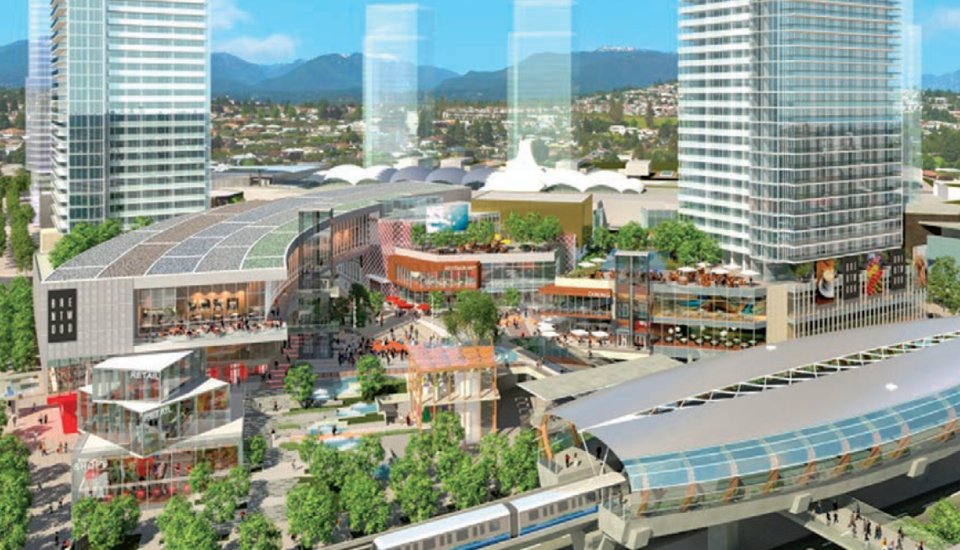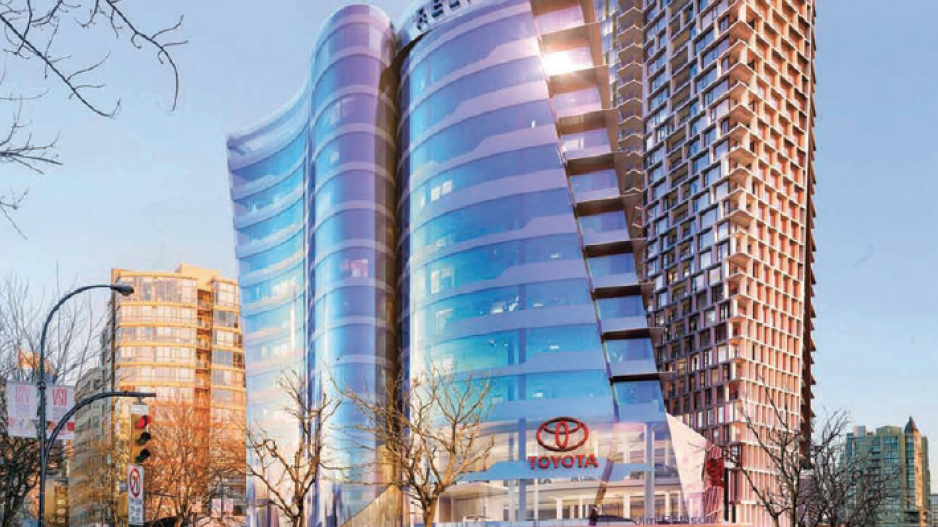It is impossible to crowbar residential investors from the outlook for the commercial real estate sector in Metro Vancouver because it is condominium buyers who have been driving commercial land and property deals to new levels.
Which makes the current housing market downturn a wild card in the outlook for the commercial real estate market into 2017. As of November, Metro Vancouver condominium resales had plunged 22% from a year earlier, reports the Real Estate Board of Greater Vancouver (REBGV). Sales of new highrise condos were down 21% from 2015 by 2016’s third quarter, according to the Urban Development Institute, and were even 4% below the pace in the 2014.
Yet, during 2016’s first nine months, sales of land for residential development accounted for 53% of commercial real estate volumes in the Lower Mainland and dwarfed every other type of commercial real estate transaction, according to REBGV’s commercial division.
Add in the 109 sales of rental apartment buildings, and residential plays made up $5.8 billion of the total $9.5 billion in commercial transactions to the end of September 2016, a dominance that has characterized the Metro market for two years.
Many commercial developments also rely on a healthy mix of condominiums to make the numbers work, whether in office or retail projects and even, lately, in industrial and hotel developments.
Still, analysts remain confident about 2017 commercial real estate investments across Metro Vancouver.
Office
Despite the addition of about two million square feet of prime space in the past 18 months, Vancouver’s office vacancy rate has fallen to 6.9%, second-lowest in Canada, according to Colliers International. With nearly 340,000 square feet taken up in 2016’s third quarter alone, the stage is set for the next round of hurry-up construction.
Office demand across the Metro region is expected to increase in 2017 following recent federal approval of new liquefied natural gas and oil pipelines, an expanding tech and film industry and a strengthening of the mining and engineering sectors.
In all, four new towers are planned with a total of 600,000 square feet of Class A space. Early betting is that Morguard’s 227,000-square-foot, 25-storey building at 601 West Hastings will lead the wave, with an estimated completion in 2019.
Two new office towers, the Exchange on Howe Street by Credit Suisse and Serracan Properties’ seven-storey building on Seymour Street, are under construction and are scheduled to be completed in 2017.
A number of Vancouver’s new office projects, such as the 235,000-square-foot Burrard Place by Jim Pattison Developments/Reliance Properties and the Cardero complex by Bosa Properties/Arpeg Holdings, include a highrise residential component.
This year could also see heated action in office transactions. In 2016, a record $1.9 billion in office building sales was reported in the first half alone, dominated by the bellwether purchase of the Bentall Centre four-tower portfolio by China-based Anbang Insurance Group for $997 million. A Germany-based investor bought the Royal Centre office tower downtown in April for $427 million.
The relatively low vacancy rate, the low Canadian dollar and rising lease rates – an average of $47.28 per square foot downtown – also point to office investments breaking to the upside in 2017, according to Colliers.
Retail
The first half of 2016 saw record transactions of retail properties in Metro Vancouver, as the sales volume hit $1.1 billion, according to Altus Group.
This could soon double as part of a single deal expected to be announced in the new year as Cadillac Fairview, the real estate arm of the Ontario Teachers’ Pension Plan, completes the projected $2 billion sale of 49% of its Metro Vancouver portfolio, which includes the 1.6-million-square-foot Pacific Centre, Vancouver’s biggest and most profitable shopping mall, and Richmond’s 760,000-square-foot Richmond Centre.
While there are persistent rumours the sale has been completed, CBRE Group Inc.’s Jim Szabo, the sale’s lead broker, said in early December, “I cannot confirm or deny, but I can say that it has not happened.”
The real estate demand is fuelled by B.C.’s roaring retail sales. In 2016, consumer sales volumes in B.C. were projected to reach $74.9 billion, up 6% from a year earlier. This would be the highest growth rate in the country, according to Statistics Canada.
And, even with the opening of Canada’s largest new indoor shopping mall in South Delta in 2016 (Tsawwassen Mills by Ivanhoé Cambridge), Metro Vancouver remains under-supplied with retail. The region’s 14.3-square-foot per-capita shopping space is the lowest among all big Canadian cities. Toronto’s is 21.6 square feet; Calgary’s is 22, according to Colliers.
The largest Metro retail projects planned or in progress, Brentwood Town Centre in Burnaby and Lougheed Town Centre on the Burnaby-Coquitlam border, both led by Shape Properties, and the Oakridge Centre in Vancouver by Ivanhoé Cambridge, all have a strong component of highrise condominiums.

Brentwood Town Centre’s retail makeover in Burnaby | Reliance Properties/Shape Properties
Industrial
Wall Financial is mixing residential with industrial development, a first in North America, with its Strathcona Village project on East Hasting Street in Vancouver. All 280 condos in the development sold out at prices ranging up to $439,000. Now 54,000 square feet of industrial and commercial space has been divided and is being sold at $450 to $700 per square foot.
“There are a lot of eyeballs on this project,” said Russ Bougie, an industrial real estate specialist and principal with Avison Young, Vancouver.
Bougie said annual lease rates for Vancouver industrial space have doubled in the past 18 months to around $20 per square foot, even higher in some areas, partly because of soaring demand from the film and tech sector that has driven Vancouver industrial vacancy down to 1.4%, the lowest in Canada.
Meanwhile, demand from traditional industrial tenants remains rock solid in a region that is expected to post the highest gross domestic product among major Canadian cities this year and already has Canada’s lowest unemployment rate.
But the lack of industrial land – an acre can sell for $1.5 million or more – could force large distribution, warehouse and heavy industrial tenants to look elsewhere, warned Lee Hester, a senior vice-president with Jones Lang LaSalle in Vancouver.
“We will lose to Calgary, we will lose to Kelowna, we will lose to Seattle and we will lose to California,” he told a Vancouver real estate conference in November. “It’s already happening. Anyone north of 100,000 square feet [is] looking at those other regions.”
The BC Real Estate Association (BCREA), however, sees no downturn in industrial demand, noting that its commercial leading indicator (CLI) index was up 2.4% in 2016’s third quarter compared with a year earlier.
“Job growth in key commercial sectors and robust consumer demand led the CLI higher in the third quarter,” said BCREA economist Brendon Ogmundson. “A rising CLI points to continued strength in B.C. commercial real estate activity in 2017.”
Late in 2016, the federal government approved the $6.8 billion Kinder Morgan Trans Mountain pipeline expansion, which is forecast to generate more than $1 billion in construction and add to demand for industrial land and property in Metro Vancouver, starting as earlier as this year.
Hotel
Metro Vancouver is the best hotel market in Canada, according to HVS International, but 2017 will see residential action shadowing both new hotel development and makeovers.
Downtown Vancouver’s Trump International Hotel & Tower, which is scheduled to open this year, has drawn headlines because of the sellout of its condominium component at prices of more than $1,200 per square foot.
Hong Kong-based Asia Standard International Group hopes to rezone the 357-room Empire Landmark in Vancouver’s West End, potentially converting the rooms to condos. A few blocks away, the Coast Plaza also intends to convert its 199 rooms to 316 rental apartments.
Meanwhile, hotel investors are facing a product shortage. The choice is building new or conversion, but both are tough calls.
“Assets would probably be close to fully priced, so we would be looking at options for how we can create value, redevelopment plays or repositions,” said Tyler MacDonald, hotels director for Oxford Properties Group.
Parq Holdings Ltd., a joint venture led by Paragon Development Ltd. and Dundee Corp., is going the redevelopment route with its Plaza of Nations casino site, building two new hotels that will add 517 rooms to downtown when they are completed this year.
Other hoteliers are competing head to head with homebuilders for sites, but Carrie Russell, managing director of valuation and advisory firm HVS Canada in Vancouver, said this can be expensive.
“Vancouver hotel developers literally have to compete with condo developers, and it just does not make very many deals economic.” •




